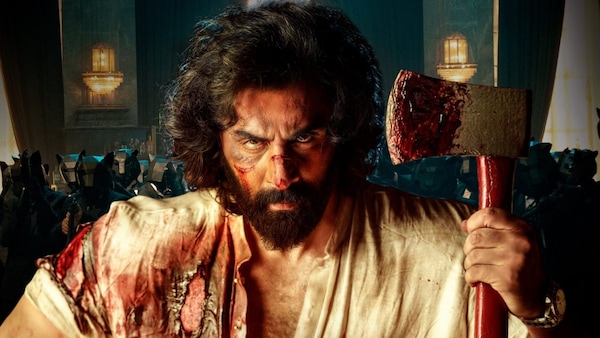Animal the film is not a creation born of love but hate - Opinion
Animal ends with a provocative gesture from Ranbir Kapoor's character, Ranvijay Singh, breaking the fourth wall— this is Vanga's not-so-subtle way of showing the finger to critics.

Last Updated: 03.26 PM, Dec 05, 2023
Filmmaker Sandeep Reddy Vanga's latest film Animal has stirred up emotions. Considering the amount of debates sparked by his previous movie Kabir Singh, which was the remake of Arjun Reddy, this scale of outrage against Animal was very well expected.
As a matter of fact, Vanga seemed to be betting on such backlash to boost global ticket sales. The film ends with a provocative gesture from Ranbir Kapoor's character, Ranvijay Singh, breaking the fourth wall— this is Vanga's not-so-subtle way of showing the finger to critics, particularly those concerned with the portrayal of male-female dynamics in his films.
Now the question arises, is it fair to view a work of art only through the lens of feminism? While feminism is undoubtedly an essential aspect of discussions surrounding a film's social and cultural impact, restricting the evaluation solely to women's issues seems lopsided and somewhat unfair to the creative and imaginative aspects of the work.
ALSO READ: Amid Animal controversy, Shah Rukh Khan's old statement on treating women in films goes viral
In India, a significant portion of films continue to exhibit biases towards female characters, and gender pay disparities persist within the film industry. The only reason we are discussing Animal with this intensity is because it has managed to sell more tickets than other films with similar problematic themes. While other filmmakers try to be subtle while incorporating their prejudices into their films, Vanga has done quite the opposite. He ostentatiously decorates the exteriors of his narration with prejudices, while burying intricate emotions underneath them.
Animal is not selling more tickets despite its problems. But, it is putting up such a robust performance at the box office because of the very problematic themes. Like its hero, Animal's moral compass is highly corrupted. It's because all the debates are mainly concentrated on a single facet of the film, and most of its shortcomings have largely gone unnoticed. The misogyny is not the only problem in the narrative; the film lacks any real depth. The theme of an absent father producing homicidal manics needed more emotional underpinnings.
Ranbir's Ranvijay Singh is not a likeable character. In a different film, he would be the villain, who needs to be stopped before he ends up setting the whole world on fire - as he keeps repeating.
Just pay close attention to Ranvijay- what are the likeable qualities in him, except for good looks and generational wealth? Nothing. Zero. Nada. He is an entitled man-child, with an inflated ego, showing clear signs of stunted emotional growth. Such colossal pride and arrogance are a luxury afforded only to those whose fathers, like Balbir Singh, are super-rich businessmen with political influence.
In the film, his audacious act of brandishing a firearm in a classroom, firing rounds to intimidate a group of misguided middle-class youngsters, goes unpunished by the law. "What's the point of all this wealth and power if we can't even do this?" questions a young Ranvijay to his father, showcasing the depths of his entitlement.
Animal isn't just about a man with problematic beliefs going on a rampage; it's a narrative about how excessive wealth breeds boredom, leading individuals to actively seek war. For Ranvijay, the purpose of power and wealth is to escape consequences, even for the most heinous acts.
While many have disparaged the hero of Animal for his utter disregard for women, they forget that he holds no regard for any human life, male or female, beyond his close family and friends.
Animal depicts Delhi as some sort of an untamed frontier, where the laws of the country don't apply to those with influential fathers, allowing people like Ranvijay to evade accountability. Characters like him are meant to be judged, not emulated—so judge him hard.
Animal is not the first film, and surely, it won't be the last to offend a sizable population. This film, however, is unique because it was made with the sole intention to provoke. Every narrative beat and expletive gesture seemingly is designed to antagonize Vanga's critics. This film is not a product of love but hate.
Hate is an overarching theme in the film. Hate for oneself and others stems from unfulfilled childhood needs and perceived betrayals are prevalent in the film, paving the way for rampant violence. There is nothing wrong with exploring hate in fictional works. The problem arises when hate is presented in the guise of a cathartic experience, devoid of any real-world consequences.
A compelling piece of art cannot be a friend to all; it risks becoming an enemy to itself. Regardless of whether you categorize Vanga's Animal as good, bad, or ugly, it has achieved its goal—prompting discussions in society.

